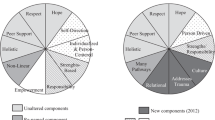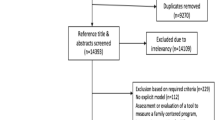Abstract
Purpose
In England, community mental health rehabilitation teams play a major role in supporting people with complex mental health needs to progress from inpatient to community settings and from more to less supported accommodation. We aimed to conduct the first study to investigate longitudinal outcomes for users of a community rehabilitation team and identify service user characteristics associated with successful progress along the rehabilitation pathway.
Methods
We used routinely collected clinical outcome data relating to all 193 users of a community rehabilitation team in inner London, transferred to the team between June 2013 and May 2018, with a cut-off data-collection date of 20th June 2019. We estimated the proportion who moved on to more independent accommodation successfully, with no breakdown in the placement. We conducted multivariable Cox proportional hazard regression to investigate associations between service user characteristics at transfer and successful move-on.
Results
Overall, 43/193 (23%) service users achieved successful move-on during a median follow-up of 51 months (IQR 32–63). This was more likely for those who were residing in more highly supported accommodation (HR 3.90; 95% CI 2.01–7.54) and those who had better functioning (HR 1.04, 95% CI 1.02–1.06) at transfer, while those with a serious physical health condition were less likely to achieve successful move-on (HR 0.44, 95% CI 0.21–0.95).
Conclusion
Most supported accommodation services aim to offer time-limited support, but most service users do not progress successfully to more independent accommodation within 4 years. Investment in interventions that improve functioning and physical health may facilitate successful move-on.
Similar content being viewed by others
References
Craig TK, Garety P, Power P, Rahaman N, Colbert S, Fornells-Ambrojo M, Dunn G (2004) The Lambeth Early Onset (LEO) Team: randomised controlled trial of the effectiveness of specialised care for early psychosis. BMJ (Clin Res Ed) 329(7474):1067. https://doi.org/10.1136/bmj.38246.594873.7C
Morgan C, Lappin J, Heslin M, Donoghue K, Lomas B, Reininghaus U, Onyejiaka A, Croudace T, Jones PB, Murray RM, Fearon P, Doody GA, Dazzan P (2014) Reappraising the long-term course and outcome of psychotic disorders: the AESOP-10 study. Psychol Med 44(13):2713–2726. https://doi.org/10.1017/s0033291714000282
Joint Commissioning Panel for Mental Health (2012) Guidance for commissioners of rehabilitation services for people with complex mental health needs. Joint Commissioning Panel for Mental Health, London
Killaspy H, Marston L, Green N, Harrison I, Lean M, Holloway F, Craig T, Leavey G, Arbuthnott M, Koeser L, McCrone P, Omar RZ, King M (2016) Clinical outcomes and costs for people with complex psychosis; a naturalistic prospective cohort study of mental health rehabilitation service users in England. BMC Psychiatry 16:95. https://doi.org/10.1186/s12888-016-0797-6
Killaspy H, Priebe S, McPherson P, Zenasni Z, Greenberg L, McCrone P, Dowling S, Harrison I, Krotofil J, Dalton-Locke C, McGranahan R, Arbuthnott M, Curtis S, Leavey G, Shepherd G, Eldridge S, King M (2019) Predictors of moving on from mental health supported accommodation in England: national cohort study. Br J Psychiatry. https://doi.org/10.1192/bjp.2019.101
Killaspy H, Marston L, Omar RZ, Green N, Harrison I, Lean M, Holloway F, Craig T, Leavey G, King M (2013) Service quality and clinical outcomes: an example from mental health rehabilitation services in England. Br J Psychiatry 202(1):28–34. https://doi.org/10.1192/bjp.bp.112.114421
Kalidindi S, Killaspy H, Edwards T (2012) Community psychosis services: the role of community mental health rehabilitation teams: faculty report (FR/RS/07). Royal College of Psychiatrists, London
Office for National Statistics (2011) 2011 census. Office for National Statistics, London. http://www.statistics.gov.uk/census2011. Accessed 15 Aug 2019
Glover GR, Robin E, Emami J, Arabscheibani GR (1998) A needs index for mental health care. Soc Psychiatry Psychiatr Epidemiol 33(2):89–96. https://doi.org/10.1007/s001270050027
Phelan M, Slade M, Thornicroft G, Dunn G, Holloway F, Wykes T, Strathdee G, Loftus L, McCrone P, Hayward P (1995) The Camberwell Assessment of Need: the validity and reliability of an instrument to assess the needs of people with severe mental illness. Br J Psychiatry 167(5):589–595. https://doi.org/10.1192/bjp.167.5.589
Parker G, Rosen A, Emdur N, Hadzi-Pavlov D (1991) The Life Skills Profile: psychometric properties of a measure assessing function and disability in schizophrenia. Acta Psychiatr Scand 83(2):145–152. https://doi.org/10.1111/j.1600-0447.1991.tb07381.x
Rosen A, Hadzi-Pavlovic D, Parker G (1989) The life skills profile: a measure assessing function and disability in schizophrenia. Schizophr Bull 15(2):325–337. https://doi.org/10.1093/schbul/15.2.325
Clark TG, Bradburn MJ, Love SB, Altman DG (2003) Survival analysis part I: basic concepts and first analyses. Br J Cancer 89(2):232–238. https://doi.org/10.1038/sj.bjc.6601118
Bradburn MJ, Clark TG, Love SB, Altman DG (2003) Survival analysis part III: multivariate data analysis—choosing a model and assessing its adequacy and fit. Br J Cancer 89(4):605–611. https://doi.org/10.1038/sj.bjc.6601120
Grambsch PM, Therneau TM (1994) Proportional hazards tests and diagnostics based on weighted residuals. Biometrika 81(3):515–526
Thornicroft G (2011) Physical health disparities and mental illness: the scandal of premature mortality. Br J Psychiatry 199(6):441–442. https://doi.org/10.1192/bjp.bp.111.092718
Thornicroft G (2013) Premature death among people with mental illness. BMJ (Clin Res Ed) 346:f2969. https://doi.org/10.1136/bmj.f2969
Killaspy H, Zis P (2013) Predictors of outcomes for users of mental health rehabilitation services: a 5-year retrospective cohort study in inner London, UK. Soc Psychiatry Psychiatr Epidemiol 48(6):1005–1012. https://doi.org/10.1007/s00127-012-0576-8
National Institute for Health and Care Excellence (2014) Psychosis and schizophrenia in adults: prevention and management (Clinical guideline [CG178]). https://www.nice.org.uk/guidance/cg178. Accessed 15 Aug 2019
Nakanishi M, Tanaka S, Kurokawa G, Ando S, Yamasaki S, Fukuda M, Takahashi K, Kojima T, Nishida A (2019) Inhibited autonomy for promoting physical health: qualitative analysis of narratives from persons living with severe mental illness. BJPsych Open 5(1):e10. https://doi.org/10.1192/bjo.2018.77
Simunovic Filipcic I, Filipcic I (2018) Schizophrenia and physical comorbidity. Psychiatr Danub 30(Suppl 4):152–157
Lim C, Barrio C, Hernandez M, Barragan A, Yamada AM, Brekke JS (2016) Remission of symptoms in community-based psychosocial rehabilitation services for individuals with schizophrenia. Psychiatr Rehabil J 39(1):42–46. https://doi.org/10.1037/prj0000154
Wykes T, Dunn G (1992) Cognitive deficit and the prediction of rehabilitation success in a chronic psychiatric group. Psychol Med 22(2):389–398. https://doi.org/10.1017/s0033291700030336
Moran GS, Baruch Y, Azaiza F, Lachman M (2016) Why do mental health consumers who receive rehabilitation services, are not using them? A qualitative investigation of users’ perspectives in Israel. Community Ment Health J 52(7):859–872. https://doi.org/10.1007/s10597-015-9905-1
Moran GS, Westman K, Weissberg E, Melamed S (2017) Perceived assistance in pursuing personal goals and personal recovery among mental health consumers across housing services. Psychiatry Res 249:94–101. https://doi.org/10.1016/j.psychres.2017.01.013
Peduzzi P, Concato J, Feinstein AR, Holford TR (1995) Importance of events per independent variable in proportional hazards regression analysis. II. Accuracy and precision of regression estimates. J Clin Epidemiol 48(12):1503–1510. https://doi.org/10.1016/0895-4356(95)00048-8
Hornik-Lurie T, Zilber N, Lerner Y (2012) Trends in the use of rehabilitation services in the community by people with mental disabilities in Israel; the factors involved. Isr J Health Policy Res 1(1):24. https://doi.org/10.1186/2045-4015-1-24
Acknowledgements
We would like to thank Rebecca Jones for her helpful advice regarding data analysis.
Funding
This study was not funded by any agencies or institutions.
Author information
Authors and Affiliations
Contributions
KPKC, HK, and AI and participated in the study design. KK collected and collated the data which were analysed by KPKC. All authors were involved in the interpretation of the data. KPKC drafted the article, which was reviewed and revised by all authors. All authors approved the final version of the manuscript and agreed their accountability in ensuring that any questions related to the accuracy or integrity of any part of the work were appropriately investigated and resolved.
Corresponding author
Ethics declarations
Conflict of interest
The authors declare that they have no conflict of interest.
Availability of data and material
All data supporting our findings will be shared on request made to the corresponding author.
Rights and permissions
About this article
Cite this article
Chan, K.P.K., Kathryn, K., Igoumenou, A. et al. Predictors of successful move-on to more independent accommodation amongst users of the community mental health rehabilitation team: a prospective cohort study in inner London. Soc Psychiatry Psychiatr Epidemiol 56, 75–84 (2021). https://doi.org/10.1007/s00127-020-01910-z
Received:
Accepted:
Published:
Issue Date:
DOI: https://doi.org/10.1007/s00127-020-01910-z




